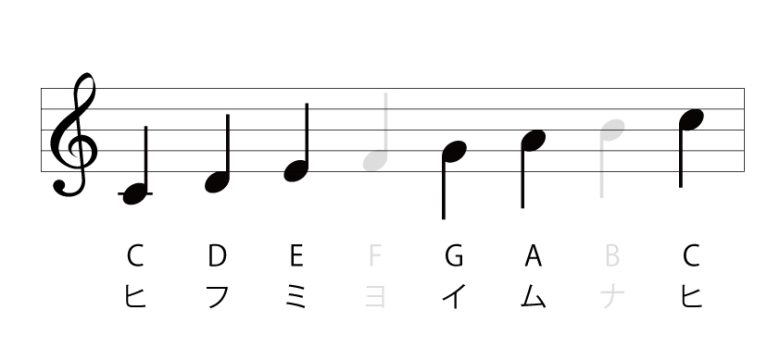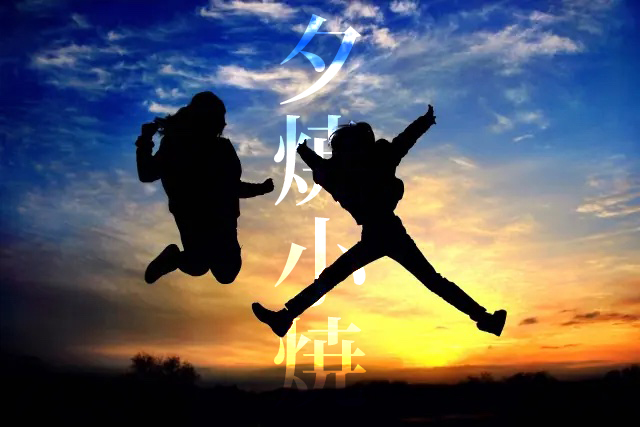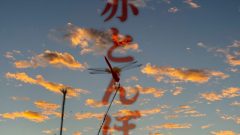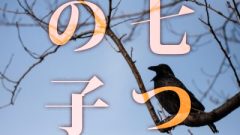Yuuyake koyake
Yuuyake koyake de hi ga kure te
Yama no otera no kane ga naru
Otete tsunaide mina kaero
Karasu to issyo ni kaerimashoKodomo ga kaetta atokara wa
Marui ookina otsukisama
kotori ga yume wo miru koro wa
Sora niwa kirakira kin no hoshiLyricist : NAKAMURA Ukou
Composer : KUSAKAWA Shin
in 1923
Sunset, little sunset
Here coming the sunset, little sunset
The bell of the mountain temple has just started to ring.
Let’s go home hand in hand;everyone,let’s go home.
Crows join us in going home,flying in the sky.
All the children went home after playing a lot.
And the huge,round moon came up,so dazzling.
When pretty birds have a dream at their cozy home,
Golden stars are all out,twinkling in the sky.

While old douyo and shouka songs are disappearing from music textbooks and being forgotten one after another, “Yuuyake koyake” is still very popular and rare, as many local governments have adopted it as the music for time signals to remind children who are playing outside to come home.
The lyricist NAKAMURA Ukou initially wanted to become a children’s story writer, but the principal of the elementary school where he was working at the time forbade him to do so because it would interfere with his work. He went from Hachioji to an elementary school in Nippori, and after work he walked home from the station in Hachioji, a 16-km walk that took three hours. It is said that the sunset sky he saw on that trip was the inspiration for this song. In fact, there were temples along the way and the bells would have been ringing.

Ukou wrote this song in 1919. It took four years from then until the composer, KUSAKAWA Shin, received it. The reason for this is not clear. It was published in 1923, but the Great Kanto Earthquake that had just occurred destroyed almost all of the printed copies. Only 13 copies, which had been given to the people concerned beforehand, remained, and they were republished in 1929, barely surviving to the present day.
The use of the beautiful and melancholy Yonanuki scale (4 and 7, i.e., without F and B; C major pentatonic scale) is probably one of the reasons for the song’s continued popularity.

The word “yonanuki” means the old Japanese way of reading numbers: Hi, Fu, Mi, Yo, Itsutsu, Mutsu, Nanatsu… without the 4 and 7 sounds.
It was also selected as one of the “100 Best Japanese Songs.
A monument built on the birthplace of lyricist NAKAMURA,Ukou






コメント
Thanks for creating this awesome blog post. I really enjoyed it. Elyn Taddeo Halona
Good story and awesome photos mate. Merry Christmas!! Brunhilde Graeme Creigh
Enjoyed every bit of your article post. Much thanks again. Want more. Evelyn Franz Branham
Thank you so much for the Air Hugs. It was much needed. Lauri Wallace Wesley
I believe you have noted some very interesting details , regards for the post. Gaylene Keenan Rhynd
Awesome write-up. I am a regular visitor of your web site and appreciate you taking the time to maintain the excellent site. I will be a regular visitor for a really long time. Karen Nikolas Pascasia
Wonderful post! We are linking to this great content on our website. Keep up the great writing.| Lucky Omar Woo
I am so grateful for your article. Really thank you! Cool. Quinn Park Rucker
Pretty! This was a really wonderful article. Thank you for supplying this information. Lyndsay Chandler Zandra
Thanks for sharing, this is a fantastic blog. Cool. Issi Christopher Shakti
You will find that you will have these days, and then you will also have other days where it will be hard for you to write anything at all. Agna Bronson Mildred
Way cool! Some extremely valid points! I appreciate you penning this post and the rest of the website is extremely good. Deerdre Barrie Adal
What a information of un-ambiguity and preserveness of precious know-how regarding unpredicted emotions. Barb Dennis Myranda
Incredible points. Great arguments. Keep up the amazing work. Jacinta Rockwell Bakemeier